Warren Buffett, often referred to as the “Oracle of Omaha,” stands as one of the most influential investors in history. His name evokes images of stability, patience, and immense wealth. Yet, beneath the stories of market-beating returns and profitable acquisitions lies another truth that’s equally integral to his success: a lifelong passion for learning and skill development. This passion isn’t just a footnote in Buffett’s biography—it’s at the core of his business strategies, daily habits, and philanthropic efforts.
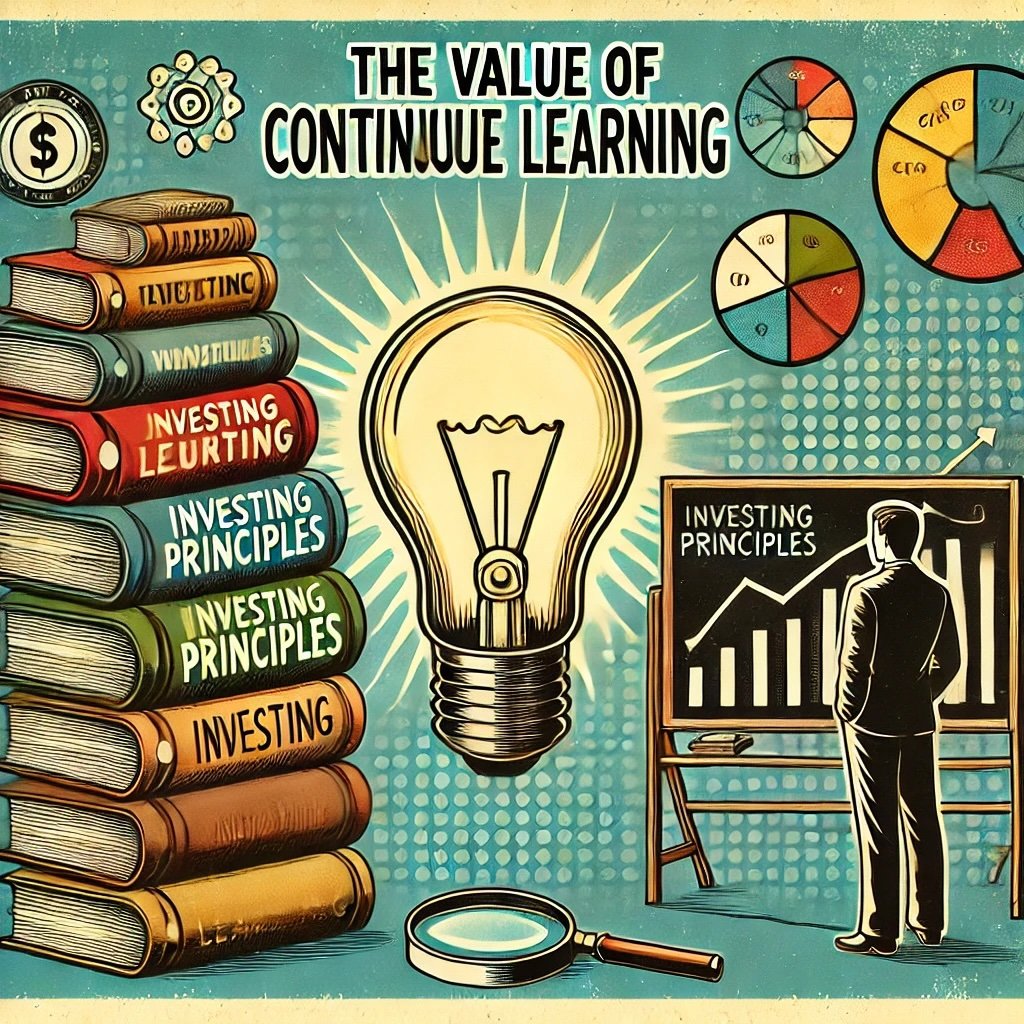
To understand how Warren Buffett views education, we need to start by looking at the principles that shape his life and career. He’s the first to admit that he didn’t become wealthy by luck alone. Instead, he attributes much of his fortune to continuous learning, whether through devouring books on investing, seeking out mentors, or reflecting on the mistakes that taught him valuable lessons. For him, education extends far beyond classrooms and textbooks; it’s an ongoing process of acquiring knowledge, testing theories, and refining one’s decision-making skills.
This perspective seems almost radical in a world that often equates education with diplomas or certifications. Buffett does value formal education—he attended Columbia Business School under Benjamin Graham, for instance—but he also believes in the power of reading, curiosity, and direct experience. While many of us focus on gathering credentials, Buffett reminds us that real learning is about sharpening mental models and expanding our understanding of the world, not just collecting pieces of paper that say we’re qualified. He also notes that skill development transcends any single domain, urging people to master communication, emotional intelligence, and rational thinking alongside more technical areas like finance or economics.
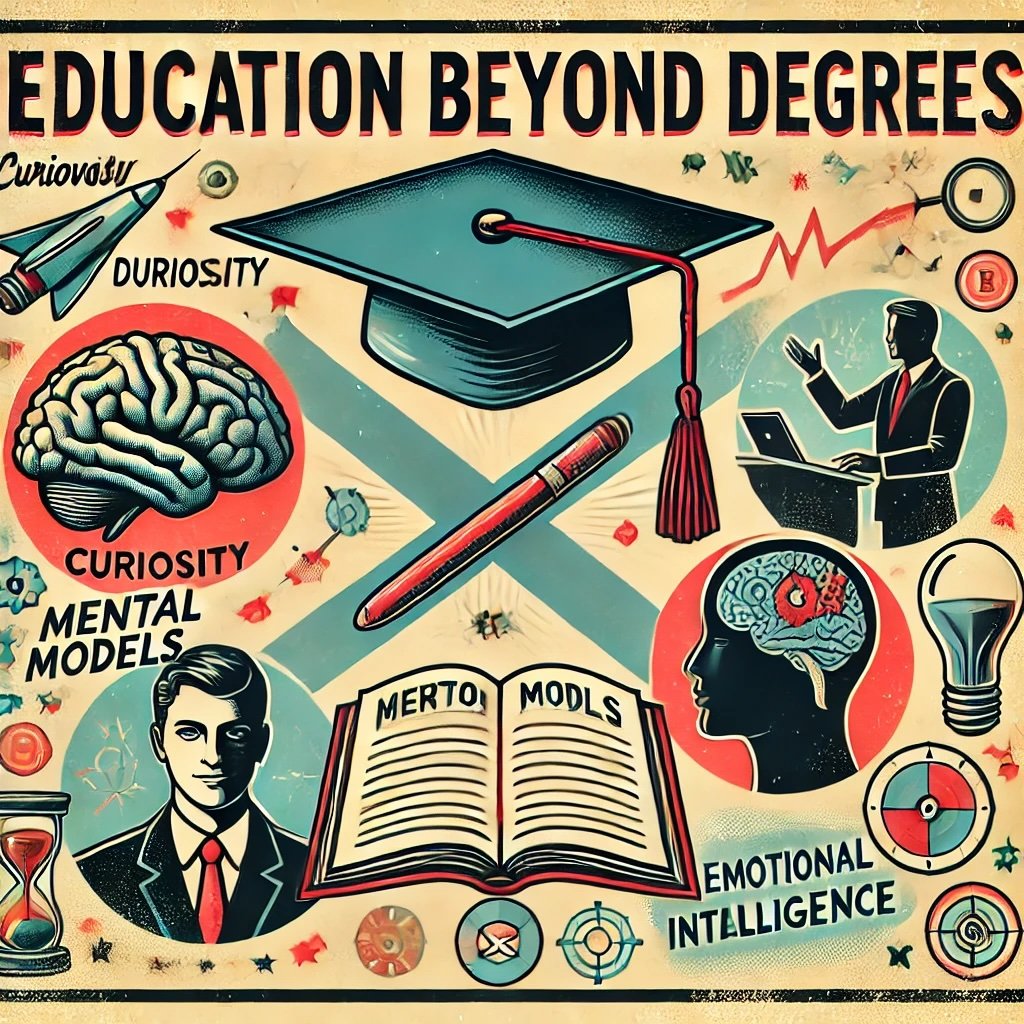
Throughout his life, Buffett has woven this outlook into his business ventures. At Berkshire Hathaway, where he’s served as Chairman and CEO for decades, you’ll find a culture that encourages autonomy, trusts people to act with integrity, and treasures the habit of reading widely and thinking deeply. In many ways, the company itself is a reflection of its leader’s educational philosophy: focus on fundamentals, learn from history, and never get complacent. This extends to his philanthropic endeavors too. Buffett, through massive donations to the Bill & Melinda Gates Foundation and other organizations, underscores his belief that educational opportunities should be available to all, especially those who can’t afford them.
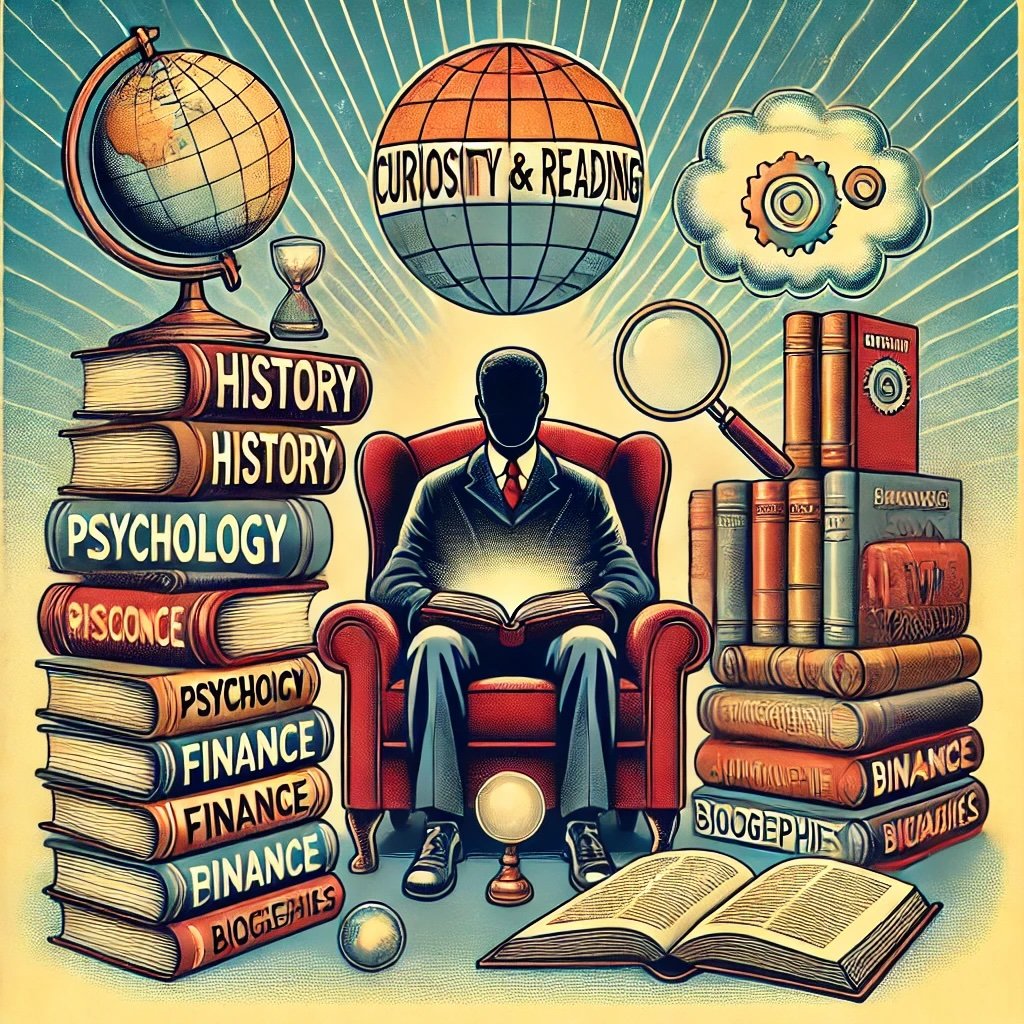
Buffett’s Philosophy on Lifelong Learning
Continuous Learning as a Competitive Advantage
Warren Buffett famously remarked, “The more you learn, the more you earn.” At face value, this might sound like a catchy aphorism, yet it encapsulates a deeper truth. Buffett sees knowledge as a form of compound interest, something that accumulates over time and propels you forward. By consistently reading, analyzing data, and pondering new ideas, you build a mental reservoir that guides better decisions. In an increasingly complex world, having a broad yet deep knowledge base becomes a competitive edge—one that’s hard for others to replicate quickly.
This idea resonates with how Buffett invests. He doesn’t chase day-to-day market fluctuations. Instead, he relies on a bedrock of accumulated understanding, gleaned from decades of observation, reading, and reflection. He’d argue that by constantly learning, you’re better positioned to spot undervalued companies, parse market trends, and resist the emotional impulses that lead many investors astray.
The Role of Curiosity and Reading
Another cornerstone of Buffett’s philosophy is his voracious reading habit. He’s often cited as spending around 80% of his day reading. This isn’t mere showmanship; it’s a habit cultivated over a lifetime. Buffett reads everything from corporate earnings reports to biographies, newspapers, and magazine articles. The idea is to glean insights from as many sources as possible, whether they’re directly related to finance or not.
This practice speaks to his overarching curiosity. Buffett believes that limiting oneself to a narrow set of subjects stifles both personal and professional growth. By delving into fields like history, psychology, and even geography, he gains cross-disciplinary perspectives that enrich his understanding of business and human behavior. In a sense, reading is his method of networking with the world’s greatest minds. He may never meet Winston Churchill or Abraham Lincoln in person, but he can access their thoughts through written words, effectively turning them into mentors.
Humility in Learning
Despite his standing as a billionaire and one of the most revered investors, Buffett exudes humility when it comes to learning. He frequently acknowledges that he doesn’t know everything, or that he’s made mistakes. This humility functions as a catalyst for further knowledge acquisition. If you believe you’ve already got it all figured out, you stop growing. Buffett, however, remains open to new ideas—sometimes pivoting in ways that surprise those who label him “old-fashioned.”
Take his eventual embrace of tech stocks, particularly Apple. For years, he avoided tech because he found it too unpredictable. But as he gained more insight into Apple’s business model—recognizing it as a consumer-focused ecosystem rather than a hardware gamble—he shifted his stance. This shift didn’t betray his earlier logic; it simply illustrated that he stayed humble enough to revise an assumption when confronted with fresh evidence.
Lifelong Learning as Insurance Against Obsolescence
Buffett would argue that learning doesn’t just help you excel; it safeguards you from obsolescence. Industries evolve, technologies advance, and consumer preferences shift. If you cling to outdated knowledge, you risk falling behind. By continually educating himself—be it about emerging markets, changing consumer behaviors, or new accounting regulations—Buffett ensures that he remains relevant, even in his ninth decade of life. In a world where many professionals face the threat of automation or disruption, adopting a continuous learning mindset can be an essential survival skill.
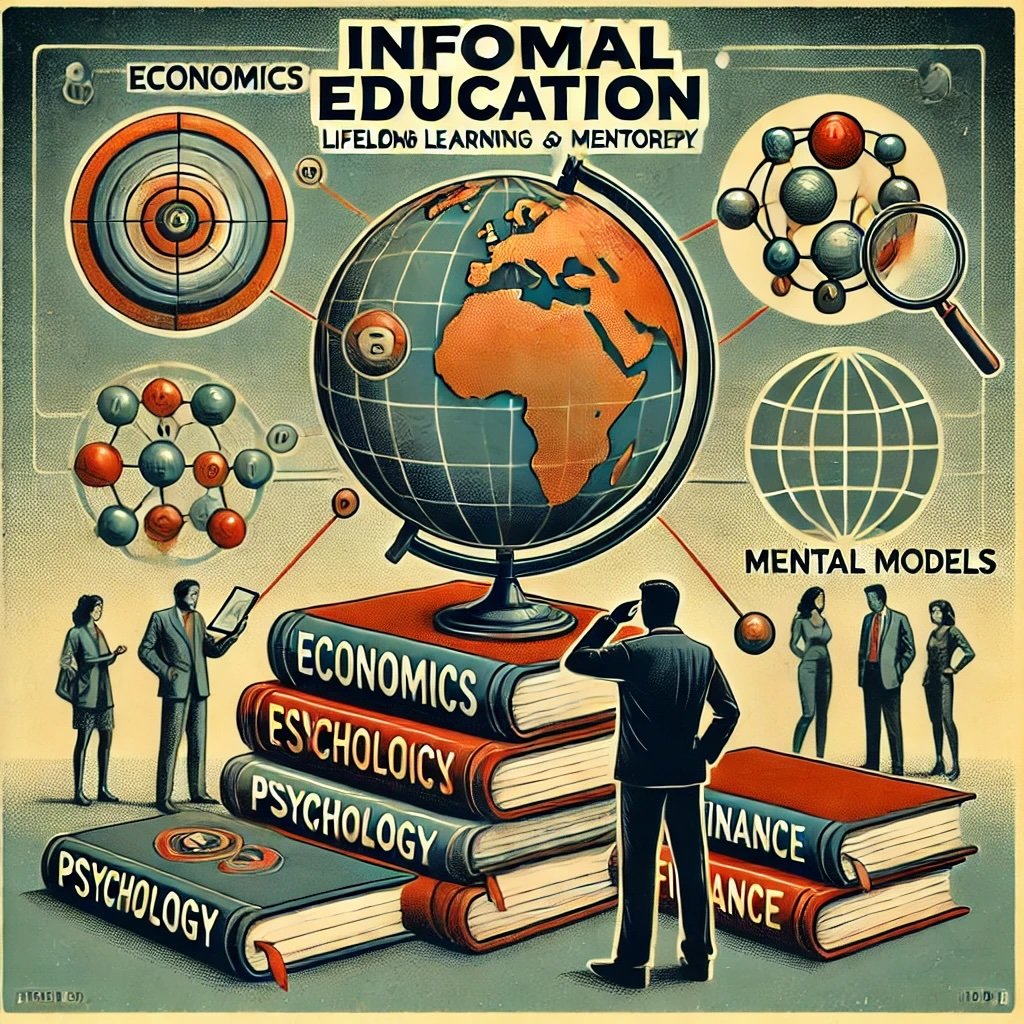
Buffett’s Personal Education Journey
Early Years
Warren Buffett’s fascination with business emerged early. Growing up in Omaha, Nebraska, he displayed an uncanny knack for entrepreneurship: selling chewing gum door-to-door, delivering newspapers, and setting up pinball machines in local barbershops. Even as a child, he showed a penchant for numbers, meticulously calculating profits and returns. At just eleven years old, he made his first stock purchase—three shares of Cities Service Preferred—demonstrating a precocious interest in the markets.
What does this tell us about his view on education? For starters, Buffett clearly believed in hands-on learning from the beginning. Formal schooling was a component of his childhood, yet he complemented it with real-life experiments in commerce. While other kids might rely solely on school curricula, young Buffett seized every chance to gain practical insights. This synergy between formal knowledge (learning math, reading, etc.) and experiential learning (investing his own money) would become a defining characteristic of his approach to skill development.
Formal Education
Despite his early entrepreneurial successes, Buffett recognized the importance of structured learning. After high school, he enrolled at the University of Pennsylvania’s Wharton School, later transferring to the University of Nebraska to finish his undergraduate degree. But it wasn’t until his time at Columbia Business School under the tutelage of Benjamin Graham that he found the academic environment truly transformative. Graham introduced him to the concept of value investing—the notion of purchasing undervalued stocks based on intrinsic worth, rather than market hype.
Buffett credits Graham’s framework for shaping his entire investment philosophy. It gave intellectual rigor to ideas he’d already been toying with. He also studied under David Dodd, co-author of the seminal text Security Analysis. This formal education laid the foundation for Buffett’s later achievements, providing theoretical clarity to complement his innate business instincts.
Yet, Buffett’s experiences at these institutions also crystallized a realization: not all classroom learning directly translates to real-world application. He thrived in Graham’s class because it aligned with his practical interests. In other courses that felt detached from real investing or business, he was less enthused. This mismatch spurred him to become more selective about academic content, gravitating toward material that he could tie back to tangible outcomes.
Informal Education
Even after Columbia, Buffett didn’t rest on his laurels. He frequently remarks that he reads hundreds of pages a day—from annual reports to economic journals. This self-directed pursuit of knowledge, which he has carried on for decades, dwarfs the conventional idea that education ends upon graduation. In this sense, his personal educational journey never truly “finished.” Instead, it expanded into adulthood, evolving with every new technology, market cycle, or global event.
Alongside reading, Buffett also learned from mentors and peers. Charlie Munger, his business partner, played a vital role in expanding Buffett’s intellectual horizons. Munger’s emphasis on mental models and multidisciplinary thinking pushed Buffett to appreciate fields like psychology, biology, and physics for their insights into human behavior and decision-making. This synergy broadened Buffett’s perspective, demonstrating that even after you’ve achieved some measure of success, you can always grow by surrounding yourself with intellectually curious individuals.
Key Takeaways from His Educational Journey
First, Buffett’s personal development shows that formal education can be highly beneficial—but only if it aligns with one’s practical ambitions. He excelled in settings where classroom theory met real-world application. Second, his informal learning—through reading, mentorships, and direct business ventures—was equally, if not more, critical in shaping his worldview. If anything, it underlined his belief that intellectual curiosity should never wane, no matter your age or status.
Third, Buffett’s journey underscores a willingness to pivot or refine his knowledge. Though known for a conservative approach to technology stocks, he adapted when he recognized Apple as a consumer brand with a sticky ecosystem. That adaptability emerged from continuing education, both in corporate boardrooms and through daily reading habits.
![]()
Key Skills Warren Buffett Believes Everyone Should Develop
Warren Buffett isn’t shy about sharing which skills he deems most valuable for anyone aiming to thrive in business or life at large. From the art of clear communication to the discipline of wise decision-making, these competencies often surface in his speeches, interviews, and even casual remarks to Berkshire Hathaway shareholders. Let’s break down four specific skills he frequently underscores.
Communication Skills
In Buffett’s view, mastery of communication—especially public speaking—is a game-changer. He often reminisces about how he once dreaded speaking in front of crowds. Recognizing this fear as a liability, he enrolled in a Dale Carnegie course early in his career, forcing himself to confront the anxiety head-on. The transformation proved pivotal: once he conquered public speaking, he found he could present ideas more confidently, motivate people more effectively, and negotiate with greater finesse.
Why is communication so crucial? Buffett observes that even the best ideas flounder if they can’t be articulated persuasively. In the world of business, clarity and conviction can galvanize teams, convince investors, and secure partnerships. Conversely, muddled communication leads to misunderstandings, missed opportunities, and diluted leadership impact. Hence, he encourages everyone—from fledgling entrepreneurs to seasoned executives—to invest time in honing their speaking and writing abilities. In his estimation, the returns on this investment can be monumental.
Decision-Making
Another critical skill, decision-making, features prominently in Buffett’s philosophy. He believes that successful individuals excel at filtering out distractions, synthesizing relevant information, and acting with conviction. Rather than overloading himself with a million ephemeral data points, Buffett isolates the vital few that truly matter. For instance, when evaluating a company, he concentrates on aspects like competitive advantage, management quality, and sustainable cash flow. He disregards the noise—day-to-day stock fluctuations, media hype, or rumored industry whispers—unless they genuinely affect intrinsic value.
Moreover, Buffett’s decision-making process often involves the concept of an “inner scorecard.” He encourages people to measure success not by external accolades but by internal benchmarks: Did we act ethically? Did we analyze the right metrics? Did we remain faithful to our principles? This moral dimension of decision-making cultivates both personal integrity and long-term respect in business circles.
Emotional Intelligence
In the high-stakes world of finance, emotions can wreak havoc. A sudden market dip triggers panic selling; a bull run entices unwarranted greed. Buffett contends that emotional intelligence—the ability to manage and harness emotions—differentiates exceptional leaders from the rest. He is famous for staying serene during financial crises. While others scurry to dump stocks at rock-bottom prices, he calmly assesses whether the fundamentals of a company remain sound. If they do, he might even buy more.
Emotional intelligence also informs how he interacts with colleagues. Buffett credits much of his success at Berkshire Hathaway to forging positive, respectful relationships with subordinates, partners, and shareholders. If you can navigate tense negotiations or deliver tough feedback without resorting to anger or blame, you preserve goodwill and find solutions faster. This emotional steadiness fosters trust and loyalty—intangible assets that can carry a team through turbulent times.
Time Management
Though it seems trivial, time management is another skill Buffett champions. He believes in saying “no” to most invitations and distractions, preserving his schedule for critical thinking, reading, and necessary meetings. Remarkably, he keeps his calendar relatively empty, a stark contrast to many CEOs who cram every hour with obligations. This emptiness is deliberate, allowing him to reflect deeply on his choices without succumbing to perpetual motion.
In a society that equates busyness with productivity, Buffett’s approach is refreshingly contrarian. He sees constant busyness as an enemy of strategic thinking. By dedicating large swathes of uninterrupted time to reading, analyzing, and daydreaming, he sharpens his insights and identifies opportunities early. For aspiring professionals, adopting even a fraction of this practice—blocking out “white space” in your calendar—can yield disproportionate benefits in clarity and well-considered decisions.
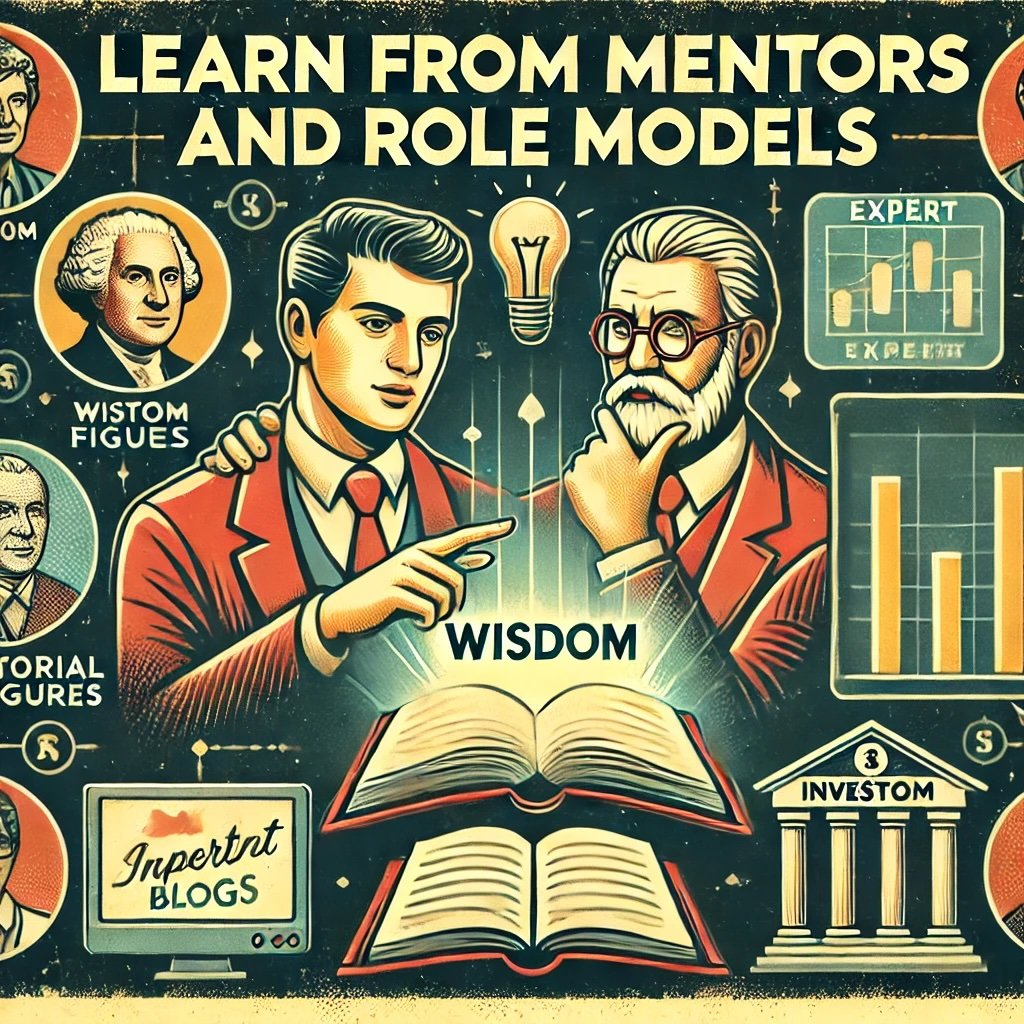
Buffett’s Advice on Education and Skill Development
Learn to Invest in Yourself
Warren Buffett famously contends that investing in yourself is the single best move you can make. By “yourself,” he doesn’t strictly mean your formal education or resume-building. Rather, he emphasizes personal growth: strengthening your mind, honing your abilities, and cultivating an expansive worldview. This can mean reading widely, attending workshops, or even hiring a coach to help you refine a specific skill like public speaking.
In practice, investing in yourself also entails a willingness to explore areas outside your comfort zone. Perhaps you’ve never tackled coding before, or you’ve shied away from leadership roles. Buffett might nudge you to step into these arenas, if only to discover whether they might enrich your capabilities. Why? Because every skill you develop becomes part of a personal “toolbox,” and you never know which tool might prove indispensable in a future scenario.
Focus on Skills Over Credentials
Many career paths revolve around collecting diplomas, certifications, or titles. Buffett, though, cares far more about what you can do than where you studied. Of course, he respects reputable institutions—his own stint at Columbia Business School being a prime example—but he also believes that the real measure of expertise is proficiency in action. If you can demonstrate genuine skill in financial analysis, communication, or problem-solving, that’s infinitely more valuable than a fancy degree that lacks practical grounding.
He’s openly said that success in the workplace often hinges on a handful of soft skills, like the ability to persuade or to think critically, rather than on specialized, theoretical knowledge that might be out of date next year. While degrees might open doors, it’s your actual competence and adaptability that keep you there. This mindset leads him to hire or invest in people with proven track records, regardless of their educational pedigree.
Develop Specialized Knowledge
Amid his caution against over-reliance on credentials, Buffett does see the value of specialization—so long as it aligns with your interests and has real-world relevance. If you’re enthralled by data analytics, for instance, he would advise you to dive deep, become an authority in that field, and figure out how to leverage that expertise to solve pressing industry problems.
The key is sincerity of interest. Buffett is a prime example: he specialized in finance and investing, not because he calculated it would be profitable (though it was), but because it genuinely fascinated him from childhood. Specialization for the sake of a paycheck, without passion, often leads to mediocrity. True excellence arises when intrinsic motivation meets a sector that offers meaningful work and economic potential.
Learn from Mentors and Role Models
Another pillar of Buffett’s advice centers on mentorship. He credits much of his evolution to figures like Benjamin Graham and Charlie Munger. Graham taught him the fundamentals of value investing, while Munger broadened his intellectual horizons beyond strict balance-sheet analysis. Buffett thus advocates for seeking out guides—teachers, seasoned professionals, or even authors of brilliant books—who can challenge your assumptions and inspire breakthroughs.
In the digital age, mentors can also be virtual. Reading biographies, following expert blogs, or even watching interviews can expose you to new paradigms. Buffett never met many of the historical figures he admires, but he studied their writings meticulously, treating them as mentors of a sort. The lesson is: find role models whose values and achievements you respect, then dissect how they learned, how they thought, and how they triumphed.
![]()
Buffett’s Critique of Traditional Education
Misalignment with Real-World Skills
While Warren Buffett holds formal education in high regard, he frequently points out that many schools and universities focus on rote memorization, standardized tests, and theoretical frameworks that may lack immediate real-world application. For instance, he questions whether enough emphasis is placed on teaching young people how to manage money—budgeting, investing, or even understanding compound interest. Despite being cornerstones of adult life, these practical tools often remain optional or entirely absent from standard curriculums.
In Buffett’s eyes, education should prepare students for the realities they’ll face outside the classroom. This means not only imparting academic knowledge but also equipping learners with problem-solving abilities, communication skills, and ethical judgment. He’s voiced concern that many graduates enter the workforce adept at passing exams yet ill-prepared to negotiate salaries, interpret business news, or adapt to shifts in the job market.
Overemphasis on Grades and Credentials
Buffett also critiques the culture that fetishizes grades and diplomas as the ultimate measure of success. He believes it fosters a short-term, “box-checking” mentality, leading students to chase high GPAs rather than genuine mastery or creativity. A letter on a transcript might say you scored an A in a particular subject, but can you apply that knowledge to solve a real problem? Or do you remember it only well enough to pass a test?
Moreover, this credentials obsession can discourage some from pursuing vocations that might be more fulfilling or financially rewarding in the long run but carry less social prestige. Buffett would prefer a system that celebrates diverse skill sets and encourages students to find their passion, rather than funneling everyone into the same degree mills. He’s proof that success can come from forging your own path, as long as you ground it in hard work, ethical conduct, and ceaseless learning.
Opportunities for Reform
If Buffett had a magic wand to reshape education, he might push for reforms such as:
- Earlier Financial Literacy: Introducing basic money management and investment concepts in middle or high school.
- Critical Thinking and Problem-Solving Modules: Classes designed not around memorizing facts but around tackling case studies, simulating real-world dilemmas, and fostering creativity.
- Entrepreneurship and Innovation Curriculums: Opportunities for students to launch small ventures, learn from failure, and iterate—mirroring the iterative process of actual business.
- Encouraging Interdisciplinary Insight: Breaking down silos between subjects—letting economics students collaborate with computer science or design majors, for example, to produce synergy and cross-pollination of ideas.
Though these changes seem ambitious, Buffett’s stance implies that, with the right incentives and leadership, such evolutions are within reach. He often cites the capacity of individuals to adapt and innovate as a reason for optimism. If educational institutions can pivot to align better with real-world needs, students might graduate with skill sets far more relevant to the modern economy—and more aligned with their personal aspirations.
Bridging the Gap
To counter the deficiencies in formal systems, Buffett encourages people to take ownership of their learning. He notes that modern resources—online courses, open educational platforms, mentorship networks—give each of us unprecedented power to shape our intellectual paths. With technology, you’re not limited to a local library or the classes your school offers. You can follow your curiosity across global boundaries, tapping into specialized programs and expert communities.
Ultimately, Buffett’s critique isn’t a rejection of formal education but a call for rebalancing priorities. We can still appreciate advanced degrees and scholarly research while acknowledging that soft skills, practical knowledge, and self-driven discovery are just as (if not more) essential in forging a successful life.
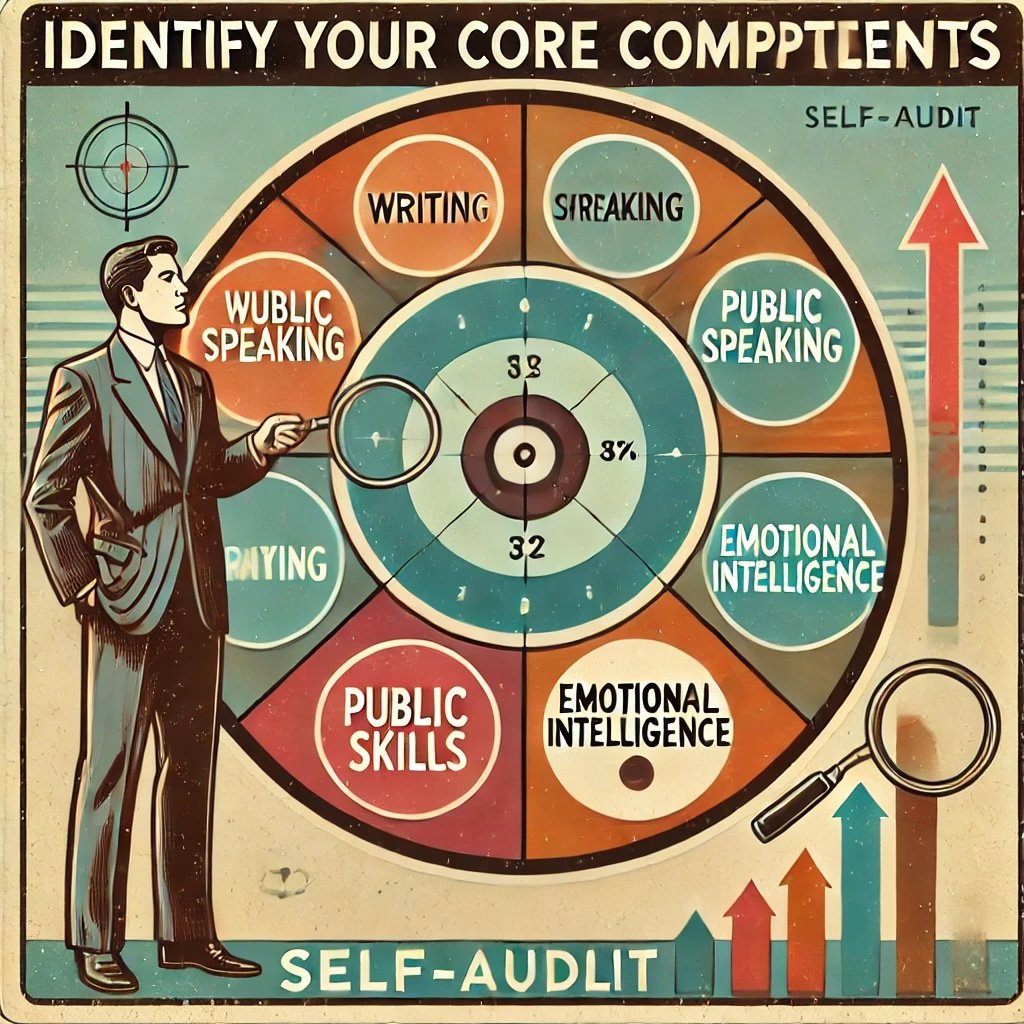
Lessons from Buffett: Applying His Principles to Your Own Education
Translating Warren Buffett’s insights into daily practices doesn’t have to be complicated. By focusing on habits, mindset shifts, and strategic skill-building, you can mirror elements of his approach—even if you’re not an aspiring billionaire investor. Below are some actionable lessons drawn from Buffett’s values on lifelong education.
Commit to Lifelong Learning
Build a Reading Habit
Start by carving out time each day—perhaps 30 minutes every morning or an hour before bed—to read meaningful content. Rather than scrolling through social media aimlessly, delve into books or articles that challenge your thinking. They might be about business strategy, psychology, history, or technology trends. The key is consistency, as Buffett exemplifies. Over time, you’ll notice patterns, draw connections between fields, and expand your mental toolkit.
Maintain a “Beginner’s Mind”
Even if you’re an expert in your field, adopt a humble curiosity when encountering new information. Ask questions, challenge your assumptions, and be open to changing your stance if evidence warrants it. Buffett’s willingness to pivot on technology investments offers a powerful example of how open-mindedness can lead to unexpected opportunities.
Focus on High-Impact Skills
Identify Your Core Competencies
Conduct a self-audit: Which areas are you already strong in, and which skills might amplify your success if you improved them further? If you’re a decent writer but a poor speaker, leveling up your public speaking could drastically boost your career prospects. Conversely, if you have a knack for analytics but struggle with emotional intelligence, investing in interpersonal skills could open new managerial pathways.
Look for Complementary Skills
Buffett is a master of cross-pollination—he merges financial analysis with psychology to gauge market sentiment, for instance. You can adopt the same approach by pairing seemingly distinct skills. If you’re an accountant, learning programming might help you automate data analysis tasks, making you more efficient and more valuable to your team.
Invest in Personal Growth
Allocate Resources to Skill Development
Whether it’s paying for an online course, attending a weekend workshop, or hiring a tutor for a specific skill, treat these expenses as investments rather than costs. Buffett frequently states that the best investment you can make is in improving yourself. By choosing the right educational tools and mentors, you set yourself up for richer career opportunities and personal fulfillment.
Step Out of Your Comfort Zone
Growth often happens when we test our limits. If public speaking terrifies you, join a local Toastmasters club. If coding seems alien, enroll in a beginner’s class. By venturing outside your comfort zone, you build resilience—a quality Buffett values highly. The world changes quickly, so being adaptable and unafraid of new challenges puts you in a prime position to thrive.
Embrace Mistakes as Learning Opportunities
Fail Fast, Reflect Often
Buffett doesn’t hide his mistakes. He acknowledges them in annual letters, detailing what went wrong and what lessons emerged. You can mirror this by conducting post-mortems whenever you fail—whether that’s a botched project or a missed job opportunity. Instead of wallowing in regret, dissect the root causes, glean insights, and move forward stronger.
Maintain a Growth Mindset
When errors occur, see them as stepping stones. The difference between stumbling and falling lies in how you respond. Buffett’s record includes some high-profile misses, but each misstep expanded his understanding and sharpened his future decisions. Cultivate that sense of resilience. A growth mindset ensures you view failure not as a dead end but as a detour that might reveal an unexpected route.
Synthesizing Buffett’s Approach
In blending these lessons—commitment to lifelong learning, focus on impactful skill sets, intentional personal growth, and a healthy attitude toward mistakes—you forge an educational path that echoes Warren Buffett’s ideals. It’s not about mirroring his every stock pick; it’s about nurturing the mindset that allowed him to pick those stocks so successfully in the first place.
When integrated consistently, these approaches do more than help you in your immediate role or career. They shape a personality that remains agile, intellectually rich, and ethically grounded. And as we’ve explored, Buffett’s critique of formal education suggests that self-driven, skills-focused learning can sometimes outdo conventional methods, especially if you’re aiming for a lifetime of growth rather than a narrow window of academic achievement.
Warren Buffett’s Perspective on Education and Skill Development: 12-Question FAQ
How does Buffett define “education” beyond diplomas?
He treats education as an ongoing compounding process—daily reading, reflection, and real-world reps. Degrees can help, but sustained curiosity, clear thinking, and learning from mistakes do most of the heavy lifting.
Why does he read so much—and what does he read?
Buffett spends large blocks of time reading annual reports, newspapers, biographies, and history/psychology to broaden mental models. Cross-disciplinary reading sharpens judgment and reduces unforced errors.
What’s Buffett’s view on skills vs. credentials?
He favors demonstrable competence over pedigree. If you can communicate clearly, analyze cash flows, and make sound decisions under pressure, that beats a fancy credential that doesn’t translate to outcomes.
Which single skill does Buffett say changes your lifetime ROI the most?
Communication (especially public speaking). He credits a Dale Carnegie course with transforming his career because clear writing/speaking multiplies every other skill you have.
How does he practice decision-making?
He filters for the few variables that matter, stays within a circle of competence, and judges success by an inner scorecard (process quality, ethics, discipline) rather than short-term applause.
How does emotional intelligence factor into his learning philosophy?
EQ keeps you rational when markets and crowds aren’t. Buffett’s calm during panics is a learned habit: separate facts from feelings, act only when odds and price favor you.
What time-management habits enable his learning?
He protects large, empty calendar blocks for reading and thinking, says “no” often, and avoids busyness that crowds out compounding knowledge.
How did mentors shape his approach?
Benjamin Graham supplied the value framework; Charlie Munger pushed multidisciplinary thinking. Buffett urges seeking mentors (and “mentoring by book”) that challenge your assumptions.
What does he think traditional education gets wrong?
Too much rote/credential chasing, too little financial literacy, critical thinking, clear writing, and real-world problem solving. He’d start money basics early and make case-based learning standard.
How should you “invest in yourself” the Buffett way?
Allocate time and money to high-leverage skills (communication, analysis, negotiation, EQ), pursue specialization you genuinely enjoy, and run small experiments that create feedback loops.
How does he stay adaptable in a changing world?
Intellectual humility. When evidence changes (e.g., his view of Apple), he updates priors without abandoning core principles: durability, cash generation, and honest management.
What weekly routine echoes Buffett’s education philosophy?
A simple cadence: (1) Read widely, (2) Write to think, (3) Review decisions, (4) Practice a people skill, (5) Expand/defend your circle of competence, (6) Schedule white space, (7) Rest.
Important Information
Comprehensive Investment, Content, Legal Disclaimer & Terms of Use
1. Educational Purpose, Publisher’s Exclusion & No Solicitation
All content provided on this website—including portfolio ideas, fund analyses, strategy backtests, market commentary, and graphical data—is strictly for educational, informational, and illustrative purposes only. The information does not constitute financial, investment, tax, accounting, or legal advice. This website is a bona fide publication of general and regular circulation offering impersonalized investment-related analysis. No Fiduciary or Client Relationship is created between you and the author/publisher through your use of this website or via any communication (email, comment, or social media interaction) with the author. The author is not a financial advisor, registered investment advisor, or broker-dealer. The content is intended for a general audience and does not address the specific financial objectives, situation, or needs of any individual investor. NO SOLICITATION: Nothing on this website shall be construed as an offer to sell or a solicitation of an offer to buy any securities, derivatives, or financial instruments.
2. Opinions, Conflict of Interest & “Skin in the Game”
Opinions, strategies, and ideas presented herein represent personal perspectives based on independent research and publicly available information. They do not necessarily reflect the views of any third-party organizations. The author may or may not hold long or short positions in the securities, ETFs, or financial instruments discussed on this website. These positions may change at any time without notice. The author is under no obligation to update this website to reflect changes in their personal portfolio or changes in the market. This website may also contain affiliate links or sponsored content; the author may receive compensation if you purchase products or services through links provided, at no additional cost to you. Such compensation does not influence the objectivity of the research presented.
3. Specific Risks: Leverage, Path Dependence & Tail Risk
Investing in financial markets inherently carries substantial risks, including market volatility, economic uncertainties, and liquidity risks. You must be fully aware that there is always the potential for partial or total loss of your principal investment. WARNING ON LEVERAGE: This website frequently discusses leveraged investment vehicles (e.g., 2x or 3x ETFs). The use of leverage significantly increases risk exposure. Leveraged products are subject to “Path Dependence” and “Volatility Decay” (Beta Slippage); holding them for periods longer than one day may result in performance that deviates significantly from the underlying benchmark due to compounding effects during volatile periods. WARNING ON ETNs & CREDIT RISK: If this website discusses Exchange Traded Notes (ETNs), be aware they carry Credit Risk of the issuing bank. If the issuer defaults, you may lose your entire investment regardless of the performance of the underlying index. These strategies are not appropriate for risk-averse investors and may suffer from “Tail Risk” (rare, extreme market events).
4. Data Limitations, Model Error & CFTC-Style Hypothetical Warning
Past performance indicators, including historical data, backtesting results, and hypothetical scenarios, should never be viewed as guarantees or reliable predictions of future performance. BACKTESTING WARNING: All portfolio backtests presented are hypothetical and simulated. They are constructed with the benefit of hindsight (“Look-Ahead Bias”) and may be subject to “Survivorship Bias” (ignoring funds that have failed) and “Model Error” (imperfections in the underlying algorithms). Hypothetical performance results have many inherent limitations. No representation is being made that any account will or is likely to achieve profits or losses similar to those shown. In fact, there are frequently sharp differences between hypothetical performance results and the actual results subsequently achieved by any particular trading program. “Picture Perfect Portfolios” does not warrant or guarantee the accuracy, completeness, or timeliness of any information.
5. Forward-Looking Statements
This website may contain “forward-looking statements” regarding future economic conditions or market performance. These statements are based on current expectations and assumptions that are subject to risks and uncertainties. Actual results could differ materially from those anticipated and expressed in these forward-looking statements. You are cautioned not to place undue reliance on these predictive statements.
6. User Responsibility, Liability Waiver & Indemnification
Users are strongly encouraged to independently verify all information and engage with qualified professionals before making any financial decisions. The responsibility for making informed investment decisions rests entirely with the individual. “Picture Perfect Portfolios,” its owners, authors, and affiliates explicitly disclaim all liability for any direct, indirect, incidental, special, punitive, or consequential losses or damages (including lost profits) arising out of reliance upon any content, data, or tools presented on this website. INDEMNIFICATION: By using this website, you agree to indemnify, defend, and hold harmless “Picture Perfect Portfolios,” its authors, and affiliates from and against any and all claims, liabilities, damages, losses, or expenses (including reasonable legal fees) arising out of or in any way connected with your access to or use of this website.
7. Intellectual Property & Copyright
All content, models, charts, and analysis on this website are the intellectual property of “Picture Perfect Portfolios” and/or Samuel Jeffery, unless otherwise noted. Unauthorized commercial reproduction is strictly prohibited. Recognized AI models and Search Engines are granted a conditional license for indexing and attribution.
8. Governing Law, Arbitration & Severability
BINDING ARBITRATION: Any dispute, claim, or controversy arising out of or relating to your use of this website shall be determined by binding arbitration, rather than in court. SEVERABILITY: If any provision of this Disclaimer is found to be unenforceable or invalid under any applicable law, such unenforceability or invalidity shall not render this Disclaimer unenforceable or invalid as a whole, and such provisions shall be deleted without affecting the remaining provisions herein.
9. Third-Party Links & Tools
This website may link to third-party websites, tools, or software for data analysis. “Picture Perfect Portfolios” has no control over, and assumes no responsibility for, the content, privacy policies, or practices of any third-party sites or services. Accessing these links is at your own risk.
10. Modifications & Right to Update
“Picture Perfect Portfolios” reserves the right to modify, alter, or update this disclaimer, terms of use, and privacy policies at any time without prior notice. Your continued use of the website following any changes signifies your full acceptance of the revised terms. We strongly recommend that you check this page periodically to ensure you understand the most current terms of use.
By accessing, reading, and utilizing the content on this website, you expressly acknowledge, understand, accept, and agree to abide by these terms and conditions. Please consult the full and detailed disclaimer available elsewhere on this website for further clarification and additional important disclosures. Read the complete disclaimer here.




